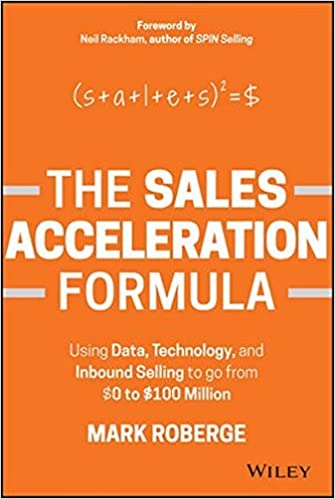I’ve been using the summer to review some of the classic books in sales and marketing and refresh some of the fundamentals to building world-class “revenue engines” described.
I started with Mark Roberge’s book “The Sales Acceleration Formula: Using Data, Technology, and Inbound Selling to go from $0 to $100 Million”.
The part of Mark’s book I like the most is about hiring salespeople. If you’re going to take advice on hiring salespeople, Mark seems like a great guy to trust in my opinion. He hired hundreds of salespeople over his time at Hubspot, while building their sales and services area from 1 employee (him) to 450 employees.
The first point Mark makes in this section of the book is a killer: “World-class sales hiring is the most important driver of sales success”. He goes on to say, “Even if I was world-class at sales training, managing, coaching, and forecasting, it would not be enough to offset a team of mediocre salespeople.”
Most companies I have encountered tend to believe that the best sales hiring formula is to poach a high-performing salesperson from their competition. Mark debunks this approach, saying “the ideal sales hiring formula is different for every company”.
Mark expands on this comment by saying that salespeople have different “superpowers”. He’s seen salespeople that are great at activity, salespeople that are great at networking, salespeople that are great at presenting etc. Meanwhile each company has its own characteristics, such as who they sell to and what kind of sales they are involved in (transactional vs. relationship). I would add the way companies work internally and their culture can be a big factor in why someone will succeed in one company in the industry but not in another. Matching salespeople’s skills with the company’s unique situation is the key to great sales hiring.
To make this matching happen at Hubspot Mark developed a sales hiring formula that was backed by analysis and data (he’s an MIT grad!) In his book he states that the hiring formula will be different for every company but the process of developing the formula is the same for every firm. The framework for the formula that is reusable is as follows (my wording).
- Develop your theory of the ideal salesperson’s characteristics: develop a scorecard for each characteristic you think a salesperson will need to be successful in your team. Put these on a “scorecard” (likely a spreadsheet) so you can score them from 1-10. You can weight some characteristics as more important than others.
- Develop a strategy of evaluating each characteristic in candidates: you then need to decide how you will evaluate each characteristic in the hiring process. You may need to develop some tools to use outside of a standard interview itself, such as quizzes, projects, role plays or reference checks.
- Score candidates against your hiring characteristics: as you meet and interview candidates you fill out your scorecard for each one (and save the scorecards.)
- Observe your salespeople’s performance in the field and modify your hiring model from there: After a few months you can now compare real world performance to your theory of sales characteristics. See which of your salespeople is performing the best and compare that to how they scored during your hiring process on each characteristic. Is there any pattern amongst those who are doing well in your environment vs those that are struggling? What does this real-world information tell you about the weights in your model (spreadsheet)? Should some be adjusted up or down? Use this information to refine your model.
That’s it! It’s not that complicated a process. This process proved to be super-effective for Hubspot, one of the software industry’s most successful companies. This kind of approach is not something I’ve seen a lot out there in the real world of small and mid-size companies so I suspect plenty of us can learn from this classic framework.
If you want to learn more and don’t have it yet, grab Mark Roberge’s book here.
